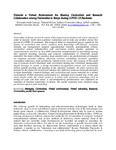Towards a Virtual Environment for Sharing Curriculum and Research Collaboration among Universities in Kenya during COVID-19 Pandemic
Abstract
Universities in Kenya need to be aware of the impact of curriculum and course sharing in order to become world-class academic institutions and to help one another during this period of COVID-19 pandemic. This research filled an unexplored gap in regards to the impact of curriculum and course enablers; trust, knowledge self-efficacy, reciprocal benefits, top management support, organizational rewards, organizational culture, curriculum system infrastructure and curriculum system quality, openness in communication, and face-to-face (F2F) interactive communication on knowledge sharing that supports teaching, learning and research collaboration by University faculty members. The study further classified these enablers into a six point pyramid of variables on adoption; personal volition, education resource availability, technical capability, conceptual awareness, legal permission, infrastructure access. The purpose of this study was to research factors associated with curriculum sharing that University management should leverage to ensure a strong innovation management process and successfully deliver quality teaching and learning to the intended customer. No prior research has focused on the impact of curriculum enablers that influence research university members to share knowledge, research findings, and curriculum and course materials via a virtual environment. Virtual education environment is a standard and accepted way of life, and many people prefer the virtual system as it comes with numerous advantages such as saving on costs and time spent. A self-administered questionnaire was employed on members of fourteen universities in Kenya. The usable responses were analysed using partial least squares path modelling.

